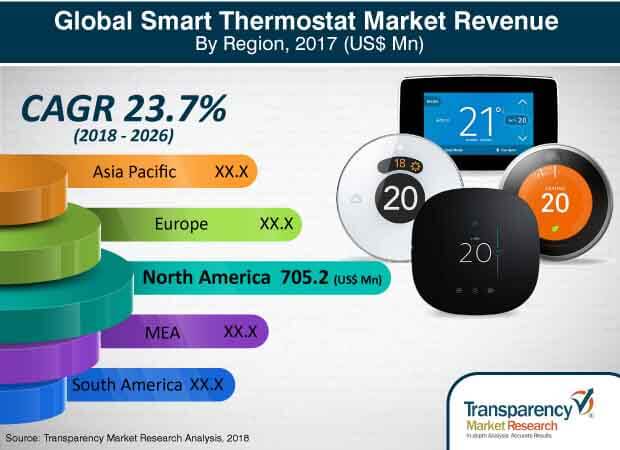Smart Thermostat Market Size, Growth, Merger, Share, Key Players, Trends, Revenue, And Regional Forecast To 2027
Global Smart Thermostat Market – Snapshot
A smart thermostat is a device used in heating, ventilation, and air-conditioning (HVAC) equipment to control the temperature of a space or room wherein these equipment are installed. A smart thermostat has the ability to make automated and smart adjustments for customers so as to achieve energy savings and to communicate with sources external to an HVAC system. Thus, the demand for smart thermostats is rising at a rapid pace. Moreover, a smart thermostat is a major energy-saving device for smart homes/buildings. Smart thermostats are largely used in residential buildings. Improvements in residential and commercial buildings have also driven the RFID industry. The global smart thermostat market is estimated to reach value of US$ 8,729.2 Mn by 2026 from US$ 1,157.6 Mn in 2017, expanding at a CAGR of 23.7% during the forecast period.
Planning to lay down future strategy? Perfect your plan with our report sample here https://www.transparencymarketresearch.com/sample/sample.php?flag=S&rep_id=35819

Increasing energy prices and rising need to optimize power in order to cut energy bills are expected to drive the global smart thermostat market during the forecast period. Encouragement from governments for using energy-saving devices is also driving the smart thermostat market. Furthermore, companies are continuously aiming at integrating smart thermostats with IoT so as to operate smart thermostats from a remote location. This is projected to boost the smart thermostat market during the forecast period. Increasing consumer awareness about safety and efficiency of smart thermostats is also likely to propel the smart thermostat market during the forecast period. Furthermore, smart thermostats have become a point of focus for scientists and researchers in the electronics industry. Smart thermostats are increasingly being adopted by small and medium enterprises (SMEs), due to the growing trend of digitization and rising adoption of building automation solutions. Wi-Fi-enabled smart thermostats are more rapid and secure compared to other types of smart thermostats available in the market. This, in turn, is expected to drive the smart thermostat market, creating better opportunities for smart thermostat manufacturers in the near future. In addition, Wi-Fi-enabled smart thermostats are being adopted continuously in numerous applications such as smart homes/buildings and commercial buildings in order to minimize their energy consumption. Smart thermostats make adjustments in home temperature, thereby reducing power consumption and reducing energy costs. Moreover, advanced features of smart thermostats, surging disposable income of people, and increasing demand for energy-saving devices are expected to fuel the global smart thermostat market during the forecast period. However, lack of awareness about smart thermostat and rising price-based competition are major factors expected to hinder the smart thermostat market during the forecast period.
The global smart thermostat market is consolidated with a limited number of companies operating in the market. Leading players are currently focusing on providing technologically advanced products to customers. Increasing demand for smart thermostat applications with their cost decreasing in the long run is expected to encourage investors to invest in the smart thermostat technology in the next few years. Maintaining quality standards is essential for manufacturers of smart thermostats in order to adhere to stringent government regulations set for different end-use industries in various countries across the world. Moreover, as a part of their strategy, companies are engaging in various acquisitions; focusing on expanding their business; and entering into strategic partnerships.
Some of the major players operating in the global smart thermostat market and profiled in the study are Carrier Corporation, Control4 Corporation, Ecobee, Inc., Nest Labs, Ingersoll Rand Inc., Emerson Electric Co, Honeywell Inc., Schneider Electric SE, NorTek Inc., Tado GmbH, and Pro1 IAQ.
Looking for exclusive market insights from business experts? Request a Custom Report here https://www.transparencymarketresearch.com/sample/sample.php?flag=S&rep_id=35819
Technological Developments to Sow the Seeds of Growth across the Smart Thermostat Market
The rising need for energy conservation among a large number of individuals will help in increasing the growth rate of the smart thermostat market to a great extent. The waves of technologies like the Internet of Things (IoT) and Artificial Intelligence (AI) have touched almost every sector and business. The smart thermostat market is also one of them. The advent of the latest technologies in home automation systems will further bring tremendous growth opportunities.
- Smart thermostats are used mainly in the residential segment for controlling air conditioning, ventilation, and heating aspects. A wide range of features are included in these types of thermostats. Some of the prominent features are remote room sensor, voice assistant support, and integration with other smart devices. All these features lay a red carpet of growth across the smart thermostat market.
- Technological advancements related to smart thermostats will bring considerable growth prospects. Automatic heating modes and easy-to-install mechanisms have helped the thermostats to attract a large consumer base. The ongoing research and development activities will serve as a profitable factor for the growth of the smart thermostat market. These activities enable the players to upgrade the thermostats with the latest features.
- Manufacturers in the smart thermostat market focus extensively on strategic collaborations. These collaborations help in increasing the influence of the players, eventually leading to an incline in the growth rate. Expansion activities also assist them in catering to the demand of the consumers seamlessly.
- The SARS-CoV-2 pandemic has influenced the growth of the smart thermostat market to a great extent. The restrictions imposed by various countries on the back of the rising prevalence of COVID-19 invited considerable loss to the smart thermostat market. However, the relaxations introduced by numerous countries to revive the economy will prove to be a golden growth opportunity for the smart thermostat market.
Comments
Post a Comment